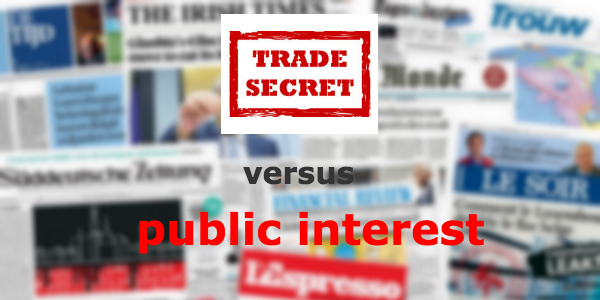Trade secrets versus public interest: Open letter to European institutions

In view of the ongoing trilogue negotiations, informal tripartite meetings attended by representatives of the European Parliament, the Council and the Commission on reaching the proposal for an EU directive “on the protection of undisclosed know-how and business information (trade secrets) against their unlawful acquisition, use and disclosure”, journalists’ and media organisations express their great concern regarding a potential damaging impact on press freedom. The following letter has been sent to the rapporteur, shadow-rapporteurs, members of the European Parliament Legal Committee, the Permanent representatives of the EU member states (COREPER) and relevant contacts in the European Commission.
Trade Secret versus Public Interest
DRAFT DIRECTIVE ON TRADE SECRETS:
Change it or leave it
European journalists’ and media organisations urge the European institutions to ensure that the draft Directive on trade secrets currently under discussion guarantees a clear and strong protection of the right to media freedom and information, or else reject the draft.
The draft Directive on trade secrets, proposed by the Commission in 2013, and currently under “trilogue” discussions between the European Commission, the Council and the European Parliament, is supposed to be adopted during Luxembourg’s presidency of the Council. The objective of the Directive is to harmonise the protection of trade secrets against industrial espionage and unfair competition in the EU. However, its impact could be much wider if appropriate safeguards are not put in place. Under the current proposal, we fear that journalists could be prosecuted if they acquire and/or use information that is deemed to be ‘‘trade secrets’’. This means that the rights to freedom of expression and information could be compromised in the interest of corporate power.
RSF, EFJ, ENPA, EMMA and EBU are extremely concerned about the current state of play of negotiations and call for a clear and explicit exception for journalists in Article 4(2) (a) of the Directive. Together, we appeal to the European Commission, the Council and the European Parliament for support on the following key points:
– There should be a clear and explicit exception for journalists in the trade secrets Directive.
According to the draft Directive, an unlawful acquisition, use, or disclosure of a trade secret (e.g. without the trade secret holder’s consent according to Article 3(3)) would be exempted from the application of the Directive, only when carried out “for making a legitimate use of the right to freedom of expression”. This notion of a “legitimate use” of a fundamental right is worrying, and means that journalists would have to justify the exercise of their right to freedom of expression.
This is therefore a very dangerous notion that could lead to prior self-censorship if journalists are not sure whether their ability to investigate could be questioned under this Directive. It creates legal uncertainty for investigative reporting and would lead to chilling effect on journalists. Even worse, journalists could be fined for publishing or disclosing information as the draft Directive requires journalists or media companies to pay “damages appropriate to the actual prejudice suffered”.
Media organisations therefore call for the deletion of the word “legitimate” in Article 4(2) (a). It should left to a judge to evaluate whether journalists make “legitimate use” of their right to freedom of expression and not for the media to self-censor.
– The Directive’s scope is too broad and should be reduced to avoid restricting journalists’ access to information and the public’s right to be informed.
The Directive would not only prohibit the use and disclosure of information defined as “trade secrets” but also the mere acquisition of such information. Even unauthorized access and copying of a trade secret would be unlawful, regardless of how it is used or whether it is disclosed. This threatens investigative journalism. The activity of journalists consists precisely in accessing information in the interest of the public’s right to know, without necessarily asking for the trade secret holder’s consent.
This is why media organisations ask the EU institutions to provide adequate protection for journalists i.e. a clear and binding exception for the purpose of media freedom under Article 4(2) (a).
– Media freedom, access to information and the public’s right to be informed must be guaranteed as laid down in the EU Charter for Fundamental Rights as a minimum protection.
We acknowledge that some general safeguards have been added to the original proposal, particularly in the text adopted by the European Parliament Legal Affairs committee, which now includes, for instance, in Recital 12 that: “Member States shall respect freedom of the press and the media (…) in order to ensure that the Directive does not restrict journalistic works, in particular with regard to investigation, protection of sources, and the right of the public to be informed. However, this guarantee for media freedom is not sufficient. The Parliament’s amendment also rightfully specifies that the Directive “shall not affect the freedom and pluralism of the media as enshrined in the EU Charter of Fundamental Rights”.
This particular addition merely says that the Directive must respect the EU Charter of Fundamental Rights. This addition will not suffice to protect journalists unless a clear and explicit exception is made for journalists disclosing information of public interest.
The Directive should moreover allow Member States to provide further protection to press freedom and independent journalism.
12 October 2015
For more information, please contact:
Renate SCHROEDER
Director
EFJ
renate.schroeder@ifj.org
Paul COPPIN
Head of the legal desk
Reporters Without Borders
justice@rsf.org
Nicola Frank
EBU, Head of European Affairs
frank@ebu.ch
Sophie SCRIVE
Deputy Executive Director
ENPA
sophie.scrive@enpa.be
Pierre DAGARD
EU Affairs Officer
EMMA
pierre.dagard@magazinemedia.eu






